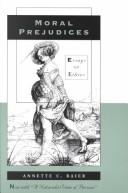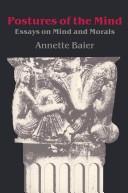| Listing 1 - 10 of 24 | << page >> |
Sort by
|
Book
ISBN: 0191809845 1282383337 9786612383335 0191573310 0199570361 0199694648 9780191573316 9780191809842 9780199570362 Year: 2009 Publisher: Oxford ; New York : Oxford University Press,
Abstract | Keywords | Export | Availability | Bookmark
 Loading...
Loading...Choose an application
- Reference Manager
- EndNote
- RefWorks (Direct export to RefWorks)
The pioneering moral philosopher Annette Baier presents a series of new and recent essays in ethics, broadly conceived to include both engagements with other philosophers and personal meditations on life. Baier's unique voice and insight illuminate topics ranging from patriotism and future generations to honesty, trust, hope, and friendship.
Ethics. --- Conduct of life. --- Ethics, Practical --- Morals --- Personal conduct --- Deontology --- Ethics, Primitive --- Ethology --- Moral philosophy --- Morality --- Philosophy, Moral --- Science, Moral --- Ethics --- Philosophical counseling --- Philosophy --- Values --- Philosophy and psychology of culture --- Political philosophy. Social philosophy --- Philosophical anthropology --- General ethics
Book
ISBN: 0674020383 9780674020382 0674713869 9780674713864 0674713850 9780674713857 Year: 1994 Publisher: Cambridge, MA ; London : Harvard University Press,
Abstract | Keywords | Export | Availability | Bookmark
 Loading...
Loading...Choose an application
- Reference Manager
- EndNote
- RefWorks (Direct export to RefWorks)
Annette Baier’s aim is to make sense of David Hume’s Treatise as a whole. Hume’s family motto, which appears on his bookplate, was “True to the End.” Baier argues that it is not until the end of the Treatise that we get his full story about “truth and falsehood, reason and folly.” By the end, we can see the cause to which Hume has been true throughout the work. Baier finds Hume’s Treatise on Human Nature to be a carefully crafted literary and philosophical work which itself displays a philosophical progress of sentiments. His starting place is an overly abstract intellectualism that deliberately thrusts passions and social concerns into the background. In the three interrelated books of the Treatise, his “self-understander” proceeds through partial successes and dramatic failures to emerge with new-found optimism, expecting that the “exact knowledge” the morally self-conscious anatomist of human nature can acquire will itself improve and correct our vision of morality. Baier describes how, by turning philosophy toward human nature instead of toward God and the universe, Hume initiated a new philosophy, a broader discipline of reflection that can embrace Charles Darwin and Michel Foucault as well as William James and Sigmund Freud. Hume belongs both to our present and to our past.
Knowledge, Theory of. --- Reason. --- Skepticism. --- Scepticism --- Unbelief --- Agnosticism --- Belief and doubt --- Free thought --- Mind --- Intellect --- Rationalism --- Epistemology --- Theory of knowledge --- Philosophy --- Psychology --- Hume, David --- Hume, David,
Book
ISBN: 0674063082 9780674063082 9780674061682 0674061683 0674261844 Year: 2011 Publisher: Cambridge, Mass. : Harvard University Press,
Abstract | Keywords | Export | Availability | Bookmark
 Loading...
Loading...Choose an application
- Reference Manager
- EndNote
- RefWorks (Direct export to RefWorks)
Marking the tercentenary of David Hume's birth, Annette Baier has created an engaging guide to the philosophy of one of the greatest thinkers of Enlightenment Britain. Drawing deeply on a lifetime of scholarship and incisive commentary, she deftly weaves Hume's autobiography together with his writings and correspondence, finding in these personal experiences new ways to illuminate his ideas about religion, human nature, and the social order.Excerpts from Hume's autobiography at the beginning of each chapter open a window onto the eighteenth-century context in which Hume's philosophy developed. Famous in Christian Britain as a polymath and a nonbeliever, Hume recounts how his early encounters with clerical authority laid the foundation for his lifelong skepticism toward religion. In Scotland, where he grew up, he had been forced to study lists of sins in order to spot his own childish flaws, he reports. Later, as a young man, he witnessed the clergy's punishment of a pregnant unmarried servant, and this led him to question the violent consequences of the Church's emphasis on the doctrine of original sin. Baier's clear interpretation of Hume's Treatise of Human Nature explains the link between Hume's growing disillusionment and his belief that ethics should be based on investigations of human nature, not on religious dogma.Four months before he died, Hume concluded his autobiography with a eulogy he wrote for his own funeral. It makes no mention of his flaws, critics, or disappointments. Baier's more realistic account rivets our attention on connections between the way Hume lived and the way he thought-insights unavailable to Hume himself, perhaps, despite his lifelong introspection.
Electronic books. --- BIOGRAPHY & AUTOBIOGRAPHY / Philosophers. --- Books in machine-readable form --- Digital books --- E-books --- Ebooks --- Online books --- Books --- Electronic publications --- Hume, David, --- Hume, David
Book
ISBN: 0416396305 Year: 1985 Publisher: London Methuen
Abstract | Keywords | Export | Availability | Bookmark
 Loading...
Loading...Choose an application
- Reference Manager
- EndNote
- RefWorks (Direct export to RefWorks)
Book
ISBN: 0674056159 9780674056152 9780674049765 0674049764 Year: 2010 Publisher: Cambridge, Massachusetts ; London, England : Harvard University Press,
Abstract | Keywords | Export | Availability | Bookmark
 Loading...
Loading...Choose an application
- Reference Manager
- EndNote
- RefWorks (Direct export to RefWorks)
Book
ISBN: 0674713850 Year: 1991 Publisher: Cambridge, Mass. London Harvard University Press
Abstract | Keywords | Export | Availability | Bookmark
 Loading...
Loading...Choose an application
- Reference Manager
- EndNote
- RefWorks (Direct export to RefWorks)
Anthropologie philosophique --- Anthropology [Philosophical ] --- Antropologie [Filosofische ] --- Antropologie [Wijsgerige ] --- Connaissance [Théorie de la ] --- Epistemologie --- Epistemology --- Epistémologie --- Filosofie van de mensheid --- Filosofische antropologie --- Homme (Philosophie) --- Homme -- Philosophie --- Homme [Philosophie de l' ] --- Kenleer --- Kennisleer --- Kennistheorie --- Kentheorie --- Knowledge [Theory of ] --- Man (Philosophy) --- Mens (Filosofie) --- Menselijke natuur (Filosofie) --- Mind --- Nature humaine (Philosophie) --- Natuur [Menselijke ] (Filosofie) --- Ongeloof --- Philosophical anthropology --- Philosophie de l'homme --- Raison --- Rationaliteit --- Rationality --- Rationalité --- Reason --- Rede --- Scepticism --- Scepticisme --- Skepticism --- Theorie of knowledge --- Theorievorming --- Théorie de la connaissance --- Unbelief --- Wijsgerige antropologie --- Knowledge, Theory of --- Agnosticism --- Belief and doubt --- Free thought --- Intellect --- Rationalism --- Anthropology, Philosophical --- Civilization --- Life --- Ontology --- Humanism --- Persons --- Philosophy of mind --- Theory of knowledge --- Philosophy --- Psychology --- Hume, David --- ヒューム --- Knowledge, Theory of. --- Reason. --- Skepticism. --- Philosophical anthropology. --- Hume, David,

ISBN: 0674587154 9780674587151 Year: 1996 Publisher: Cambridge, Mass.: Harvard university press,
Abstract | Keywords | Export | Availability | Bookmark
 Loading...
Loading...Choose an application
- Reference Manager
- EndNote
- RefWorks (Direct export to RefWorks)
Annette Baier delivers an appeal for our fundamental moral notions to be governed not by rules and codes but by trust: a moral prejudice. Along the way, she gives us the best feminist philosophy there is. Baier’s topics range from violence to love, from cruelty to justice, and are linked by a preoccupation with vulnerability and inequality of vulnerability, with trust and distrust of equals, with cooperation and isolation. Throughout, she is concerned with the theme of women’s roles. In this provocative exploration of the implications of trusting to trust rather than proscription, Baier interweaves anecdote and autobiography with readings of Hume and Kant to produce an entertaining, challenging, and highly readable book.
Ethics --- Ethiek --- Ethiek [Feministische ] --- Ethique --- Ethique féministe --- Feminist ethics --- Feministische ethiek --- Feminism --- Deontology --- Ethics, Primitive --- Ethology --- Moral philosophy --- Morality --- Morals --- Philosophy, Moral --- Science, Moral --- Philosophy --- Values --- Moral and ethical aspects --- Ethics. --- Feminist ethics.

ISBN: 0816613273 0816655480 9780816613274 Year: 1985 Publisher: Minneapolis (Minn.): University of Minnesota,
Abstract | Keywords | Export | Availability | Bookmark
 Loading...
Loading...Choose an application
- Reference Manager
- EndNote
- RefWorks (Direct export to RefWorks)
Postures of the Mind was first published in 1985. Minnesota Archive Editions uses digital technology to make long-unavailable books once again accessible, and are published unaltered from the original University of Minnesota Press editions. Annette Baier develops, in these essays, a posture in philosophy of mind and in ethics that grows out of her reading of Hume and the later Wittgenstein, and that challenges several Kantian or analytic articles of faith. She questions the assumption that intellect has authority over all human feelings and traditions; that to recognize order we must recognize
Knowledge, Theory of --- Intellect --- Ethics --- Epistemology --- Theory of knowledge --- Philosophy --- Psychology --- Human intelligence --- Intelligence --- Mind --- Ability --- Thought and thinking --- Deontology --- Ethics, Primitive --- Ethology --- Moral philosophy --- Morality --- Morals --- Philosophy, Moral --- Science, Moral --- Values --- Ethics. --- Intellect. --- Knowledge, Theory of.
Book
ISBN: 0674030907 9780674030909 0674268911 067426892X Year: 2008 Publisher: Cambridge, Mass. Harvard University Press
Abstract | Keywords | Export | Availability | Bookmark
 Loading...
Loading...Choose an application
- Reference Manager
- EndNote
- RefWorks (Direct export to RefWorks)
Character --- Knowledge, Theory of --- Philosophical anthropology --- Reason --- Skepticism --- Scepticism --- Unbelief --- Agnosticism --- Belief and doubt --- Free thought --- Mind --- Intellect --- Rationalism --- Anthropology, Philosophical --- Man (Philosophy) --- Civilization --- Life --- Ontology --- Humanism --- Persons --- Philosophy of mind --- Epistemology --- Theory of knowledge --- Philosophy --- Psychology --- Ethology --- Ethics --- Personality --- Hume, David --- Hume, David,
Book
ISBN: 9780674061682 Year: 2011 Publisher: Cambridge, Mass. Harvard University Press
Abstract | Keywords | Export | Availability | Bookmark
 Loading...
Loading...Choose an application
- Reference Manager
- EndNote
- RefWorks (Direct export to RefWorks)
| Listing 1 - 10 of 24 | << page >> |
Sort by
|

 Search
Search Feedback
Feedback About UniCat
About UniCat  Help
Help News
News